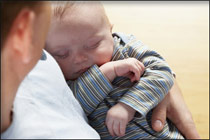Andrology Services
Diagnostic Semen Analysis
 The diagnostic analysis of human semen and/or sperm can reveal answers to the cause of a couple's infertility and post vasectomy semen analysis. This analysis measures the number of sperm present in the ejaculate (sperm count) and measures the total volume and the percent of the sperm that are moving (motility). No significant white or red blood cells, sperm clumping and/or hyperviscosity should be present. Semen analysis results are determined according to the guidelines established by the World Health Organization (WHO).
The diagnostic analysis of human semen and/or sperm can reveal answers to the cause of a couple's infertility and post vasectomy semen analysis. This analysis measures the number of sperm present in the ejaculate (sperm count) and measures the total volume and the percent of the sperm that are moving (motility). No significant white or red blood cells, sperm clumping and/or hyperviscosity should be present. Semen analysis results are determined according to the guidelines established by the World Health Organization (WHO).
Semen Analysis with Strict Morphology and Vitality Staining
These two advanced parameters are not included in diagnostic semen analysis all the time. Strict morphology of spermatozoa explains the detailed morphological abnormalities of sperm. This helps to find the causes of failed fertilization when semen having normal values is used for insemination. If the motility of the semen analysis is less than 45%, vitality staining is performed to confirm the presence of living sperm. In some cases sperm may show no progressive motility but still be alive. Staining of sperm with vital stains helps to know the ratio of live and dead spermatozoa especially in case of low motility. Not all the immotile sperm are dead, staining of sperm differentiate between live and dead sperm. The presence of a large portion of "live" but immobile sperm may be an indicator of a structural defect in the sperm tail.
Retrograde Ejaculate Testing
Retrograde ejaculation is a disorder that causes the semen to be released backward into the bladder during ejaculation. This condition may be congenital but also may be found in men with diabetes, multiple sclerosis, or who have had previous prostate surgery. It may be a side effect of certain medications, such as antidepressants and blood pressure medicine. Urine is collected and studied to determine if there is retrograde ejaculation present; if so, the sperm is evaluated.
Testing of Sperm for Anti-sperm Antibodies for Male and Female
This is the only diagnostic test to indicate the presence of antisperm antibodies (ASAB) in human fluids and tissues. There are two types of ASAb. Type-1 immobilizes the sperm and Type-II masks the sperm receptors that may result in infertility by inhibiting the binding of sperm to the oocyte. The ASAb may be detected in both males and females. The degree of ASAb binding and/or the location of binding on the sperm may be relevant.
Sperm wash for Intra-Uterine Insemination (IUI)
The most basic preparation is the sperm wash. This technique removes the sperm from their natural fluid and places them in an artificial fluid which improves sperm motility, longevity and the ability to penetrate an egg upon reaching the site of fertilization. The gradient centrifugation, the most common and successful preparation, allows separation of the sperm with the best movement from those with poor or no movement. Occasionally the sperm count or motility is too low to do the gradient centrifugation. If this is the case, alternative techniques, such as a sperm incubation, can be used.
Cryopreservation of Semen
The Andrology laboratory also offers sperm freezing. There are many reasons to freeze sperm, including prior to an impending vasectomy, prior to treatment with irradiation or chemotherapy, prior to the use of certain medications, after vasectomy reversal, for couples undergoing insemination where the husband is frequently gone and prior to in vitro inseminations(IVF). Sperm are frozen by adding a "cryoprotectant" solution to the sample, mixed gently in a small plastic cryovial and the placed in liquid nitrogen vapors until frozen. Samples will be destroyed or eliminated anytime by signed written notification from the patient.
Testicular Epididymal Sperm Aspiration (TESA)
TESA is one of the newest state-of-the-art technology provided by the CGFI IVF Program of Middle Georgia. The TESA procedure removes sperm directly from a man's testicles, bypassing his reproductive tract. The CGFI Program has been successful in retrieving sperm in 100% of cases, reporting no difference in fertilization rates in males requiring TESA compared to males with low sperm counts (total motile sperm < 20 million when combined with Intracytoplasmic Sperm Injection and IVF.)
Men who have a low or absent sperm count due to obstructive causes like failed vasectomy reversal, absence of vas deferens or scar tissue in their outlet track can benefit from this new procedure. This may also benefit some men who make low levels of sperm due to problems in the testicles.
What is the Cost of Andrology Services?
The cost involved is dependent upon the tests that are required and the treatment that is performed. Insurance coverage varies widely. You should consult with your specific plan to find out what coverage is offered. We will be happy to provide an estimated cost analysis for each procedure at the time of your initial consultation.
How Do I Schedule Andrology Tests or Procedures?
Click here if you would like to schedule an appointment for testing or cryopreservation or if you have questions. You may receive information from one of our Nurse coordinator or Embryologist.
Instructions for Semen Analysis with the Andrology Laborator
All couples entering the IVF program are required to have a comprehensive semen analysis with our Andrology laboratory. We cannot accept semen analysis reports from outside institutions. The purpose of this analysis is to look at the semen parameters and to determine whether fertilization should be attempted with standard in vitro fertilization or with intracytoplasmic sperm injection. Refrain from ejaculation for 2-4 days before your appointment. Longer or shorter periods of abstinence may result in abnormal results. You may collect the specimen at home if you live within one (1) hour from our office. Please request a special collection packet if you plan to collect at home. If you live more than one hour from the office we request you use our facility. We have a room designed for your privacy and comfort.
We require presentation of photo identification by person providing or dropping off sample at the office. You will be asked to complete a specimen information sheet by the Lab personnel. The semen specimen should be produced by masturbation. Do not use lubricants since they may be toxic. Do not collect the specimen with a regular condom since they contain chemicals that are toxic to sperm. If you cannot provide the specimen by masturbation, we have specially designed condoms, called a Semen Collection Device that is less toxic to sperm. The specimen must be collected in a sterile container supplied by our office or purchased at a pharmacy or medical supply company. Do not use a bottle or jar from home as it may be contaminated. Avoid the use of hot tubs or spas, the adverse effects of elevated temperature on semen quality can last over 90 days from the time of the heat exposure. A fever can also effect semen quality.
Men with adequate semen analysis will be designated for IVF. Those with sub-optimal analysis will be designated for ICSI. On the day of the woman's oocyte (egg) retrieval this may be changed if there is a major change in the semen parameters.
Men who have no sperm in their ejaculate will need to have an aspiration (MESA or TESA). In order to schedule this and assure that a urologist is available, the patient must make an appointment with the urology clinic. Contact the IVF nurse who will assist you in making arrangements for scheduling the male retrieval.
Male Factor treatment Option
 If a diagnosis of male factor infertility has been given, there are several options open to the couple. Depending on the causative factor, it is possible that the ICSI procedure would be all that is necessary. In certain males, it may be necessary to have the sperm extracted surgically with a procedure known as MESA or TESA. Because there is a small but real chance of not finding any sperm at the time of the male retrieval, we require that men who need a MESA or TESA undergo their procedure (and freeze sperm that is obtained for use later) before entry into the IVF program. If no sperm is found, you will need to make an appointment to discuss your alternatives.
If a diagnosis of male factor infertility has been given, there are several options open to the couple. Depending on the causative factor, it is possible that the ICSI procedure would be all that is necessary. In certain males, it may be necessary to have the sperm extracted surgically with a procedure known as MESA or TESA. Because there is a small but real chance of not finding any sperm at the time of the male retrieval, we require that men who need a MESA or TESA undergo their procedure (and freeze sperm that is obtained for use later) before entry into the IVF program. If no sperm is found, you will need to make an appointment to discuss your alternatives.
In certain circumstances the male partner may be sterile. In these cases, we do provide donor sperm services. While we do not maintain our own sperm bank, we do have the names of several sperm banks that you can contact if this is necessary. You and your spouse should discuss the use of donor sperm with your doctor.
The participating sperm bank carefully screens donor sperm. Detailed descriptions of the donors are available by mail or on the internet. The descriptions are meant to help you make an informed choice. It is the couple's responsibility to order and pre-pay for any sperm specimens shipped to Walter Reed for use in the IVF procedure. It is important that you contact us before you have donor sperm specimens shipped to us so that we can make sure that we are available when it is delivered. Please call 478-757-7888 to make these arrangements. We will assist you in any way we can.